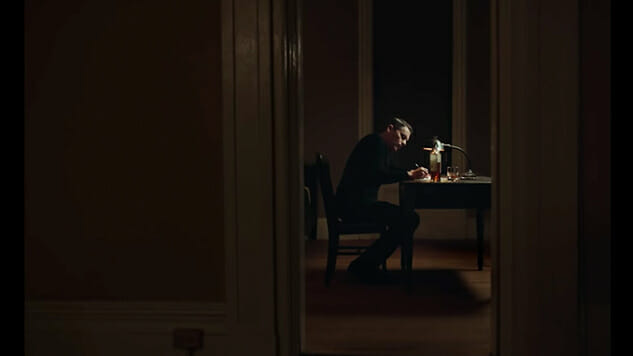A Room of One’s Own: Paul Schrader’s Queered Masculinity

Paul Schrader likes his men falling apart. The things that make them men (to themselves) are the very things that burst their sanity at the seams, the very things that may be at the root of their self-destruction. His “man in a room” films—like Taxi Driver, American Gigolo, Light Sleeper, The Walker and, now, First Reformed —are studies in masculinity unraveling. As he studies the follies of manhood, or what the protagonists conceive of as manhood, Schrader’s approach to queered masculinity can even be found in works like Auto Focus and in his biopic on renowned writer Yukio Mishima, Mishima: A Life in Four Chapters.
First Reformed, though, takes his preoccupation—with placing a man in a room and forcing that man to deal with his body and with his soul and with his body and soul in a world that’s falling apart—to its most logical end. With some of the most severe mise-en-scene in his career, Schrader places his military-vet-turned-pastor, Father Toller (Ethan Hawke), in a room as he tries to reconcile with his despair. That room, to Schrader, is where profane and divine meet, where they battle, both internally and externally. In Schrader movies, the room is as much a representation of the body and mind as the men themselves. Toller’s room is as bare as Toller wishes his soul to be.
In 1980’s American Gigolo, Richard Gere’s high-priced escort Julian knows what he’s good at, and proud of it, too. His clients are predominantly older women, women whose husbands, in his understanding, have forgotten them, or whose desires and need for pleasure have been discarded. His ability to satisfy them—he calls this “a challenge” he is up to—gives him fulfillment, he implication of meaning in his life. That life, otherwise, is organized; there is a routine to his actions. His home is modern, defined by the intentional affectation of someone putting on appearances. That’s what he does for a living: He puts on appearances. Julian’s image aspires to be the most charming and eligible man, even when he’s playing naïve, as he does with one client. He feigns stupidity, though when he does so as a simple chauffeur, he exudes the kind of sex appeal that’s only natural because it’s so practiced. He works out, sculpts himself. When he places his clothes on the bed (they’re Armani), he crafts the best version of himself to sell to others.
Julian has standards when it comes to tricks: no kink, no fag stuff. But those standards, and the secrets he’s kept so well for the women that have employed him, fall apart when he becomes embroiled in a murder case, the victim being one of his tricks. As he loses all sense of himself and the control he once thought he had over his world, the meticulously created artifice of his life dissolves rapidly. Though Julian is (ostensibly) heterosexual, American Gigolo is a queer film by virtue of its form. Schrader imbues the film with queer aesthetics, its Californian, neon-painted fakeness, its kitschy set design (the loudest furniture juxtaposed against the most austere symmetry) and its little does of Blondie, “Call Me” blaring at the beginning of the film. One of his pimps, Leon (Bill Duke) is gay and black, and the affair he carries on with Michelle Stratton (Lauren Hutton), the wife of a well-known politician, feels like a stiff fantasy. Masculinity is a prison, the film almost seems to suggest, as the masculine self Jules so dutifully crafted begins to sour and fall apart. His world sinks, and he’s left with almost no one.
-

-

-

-

-

-

-

-

-

-

-

-

-

-

-

-

-

-

-

-

-

-

-

-

-

-

-

-

-

-

-

-

-

-

-

-

-

-

-

-








































